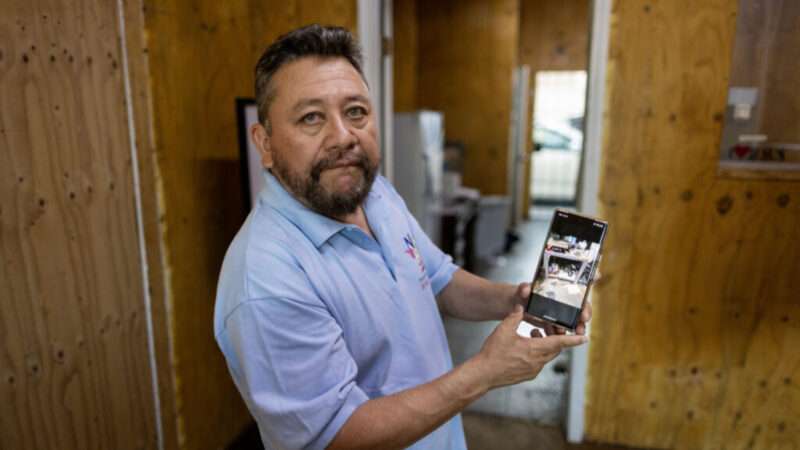

In a number of cases around the country, law enforcement agencies have destroyed or severely damaged the homes or businesses of innocent people. When property owners sue for compensation under the Takings Clause of the Fifth Amendment (which requires payment of "just compensation" when the government takes private property), law enforcement usually claims they aren't required to provide it because their actions fall within the "police power" exception to takings liability. The latest case of this kind involves an LA SWAT team that severely damaged an innocent man's store in the process of unsuccessfully trying to detain a suspect.
Reason's Billy Binion summarizes what happened:
It took Carlos Pena decades to build his local business after immigrating to North Hollywood, California, from El Salvador. It only took a few hours to destroy it.
While Pena is the one who created NoHo Printing & Graphics, where he fashioned commercial signs and banners, T-shirts, headshots, and other products, he is not the one who did the damage, despite the fact that he has been left with the bill and without a livelihood.
In early August of last year, after a fugitive violently thrust Pena from his shop and barricaded himself inside, a SWAT team from the City of Los Angeles fired more than 30 rounds of tear gas canisters over the course of 13 hours. When the government entered the building, the officers found their target had escaped. Left inside was a shop that was a shell of itself, with Pena's inventory ruined and the bulk of his equipment unusable.
Pena didn't fault the city for attempting to subdue an allegedly dangerous person. But he objected to what came next: The government refused his requests for compensation, strapping him with expenses that exceed $60,000 and a situation that has cost him tens of thousands of dollars in revenue, as he has been resigned to working at a much-reduced capacity out of his garage, according to a lawsuit he filed this month in the U.S. District Court for the Central District of California.
"Apprehending a dangerous fugitive is in the public interest," the suit notes. "The cost of apprehending such fugitives should be borne by the public, and not by an unlucky and entirely innocent property owner."
As Pena acknowledges, the police were justified in seeking to arrest this suspect. Perhaps they were even justified in using tactics that ended up destroying much of an innocent man's store (though those tactics ultimately failed in their purpose and the fugitive got away). But the city is not justified in denying him compensation. As the Supreme Court famously stated in Armstrong v. United States (1960), "[t]he Fifth Amendment's guarantee that private property shall not be taken for a public use without just compensation was designed to bar Government from forcing some people alone to bear public burdens which, in all fairness and justice, should be borne by the public as a whole."
The "public burden" of law enforcement should not be arbitrarily imposed on innocent people who had the misfortune of having their property be in the wrong place at the wrong time when a fugitive decides to hole up there. Carlos Pena's property was taken by the government for a public use no less than if they had used eminent domain to build a road over his land.
Despite the strong case for compensation in such situations, previous court decisions have reached widely divergent decisions in these kinds of cases. The Tenth Circuit's 2019 decision in Lech v. Jackson is a notable recent example of a case where courts have ruled that the "police power" exception to takings liability immunizes nearly all law enforcement operation (I criticized Lech here). In Lech, as in the present case, police inflicted massive damage on an innocent person's property in an attempt to smoke out a fugitive.
In Baker v. City of McKinney, decided last year, a federal district court disagreed with Lech (the judge was in a different circuit and therefore not bound by the Tenth Circuit's decision), and paved the way for a jury verdict awarding over $59,000 in damages to a homeowner whose house was severely damaged by a police SWAT team trying to apprehend a fugitive who had holed up inside. In my view, Baker is a better-reasoned decision than Lech, for reasons I summarized here:
The fact that the "police power" may have been involved does not normally immunize the government from takings liability. As the Lech decision notes, the police power extends to government actions "for the protection of public health, safety, and welfare." Modern jurisprudence defines these concepts very broadly. Yet, in many contexts, courts nonetheless routinely rule that takings have occurred even though the purpose of the law at issue was to protect health or safety. For example, in the classic 1922 case of Pennsylvania Coal v. Mahon, the Supreme Court ruled that a prohibition on mining can qualify as a taking, even though its purpose was to protect the safety of people and property on the surface. Similarly, environmental regulations can sometimes qualify as takings if they destroy enough of the value of a property, even though their purpose is often to promote health or safety…
Outside the context of law-enforcement operations, the fact that the government was trying to promote public safety does not create blanket immunity from having to compensate innocent owners whose property is taken or destroyed in the process. There is no good reason to exempt law-enforcement operations from takings liability of the same kind that applies to other government actions that might enhance public safety.
Indeed, as the Supreme Court recognized in the 2015 Horne case, the Takings Clause was inspired in the first place in part by revulsion at both British and American forces' seizure of property during the colonial era and the Revolutionary War. Many of these British actions were, of course, undertaken for the purpose of enforcing British law against recalcitrant colonists.
In December 2019, the US Court of Federal Claims ruled that the US Army Corps of Engineers was liable for a taking when it deliberately flooded numerous properties in Texas during Hurricane Harvey in order to prevent even worse flooding elsewhere. In 2012, the Supreme Court ruled that the government could be liable for a taking when it inflicted recurrent flooding on property, even though the purpose of the flooding was to protect farm interests in the region. If the "police power" theory doesn't immunize the government in these kinds of cases, despite potentially massive benefits to public safety, it is difficult to see why law-enforcement operations should be given blanket immunity from takings liability.
Here, as elsewhere, if there really are great public benefits from the government's seizure or destruction of property, it should be willing to pay for the damage it inflicts on innocent owners. If, on the other hand, law enforcement agencies find that they routinely end up paying compensation that far exceeds any plausible benefit arising from the use of such aggressive tactics, then…. [m]aybe they should be more careful about destroying property in the future.
So far, the Supreme Court has turned down opportunities to resolve this issue. Perhaps they will take it up in the future.
NOTE: The plaintiffs in this case are represented by the Institute for Justice, for which I served as a summer clerk when I was a law student, and have written pro bono amicus briefs in various cases more recently. I do not have any involvement in the present litigation, however.
The post Another Takings Case in Which Law Enforcement Severely Damaged an Innocent Person's Property appeared first on Reason.com.







